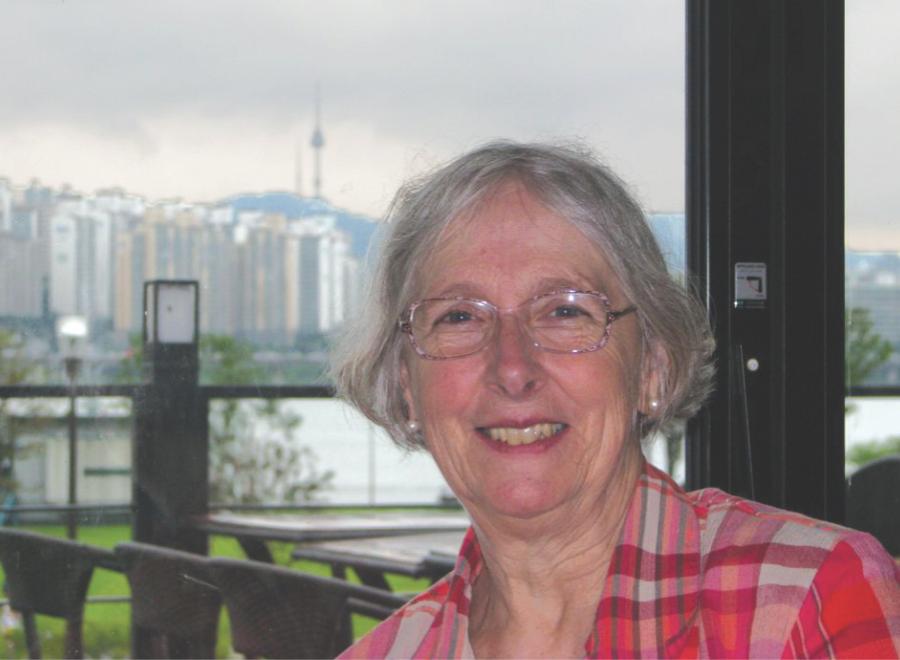Since returning to Canada in August, Rev. Rob and Keiko Witmer have criss-crossed southern Ontario for a flurry of presentations, meetings and worship services.
After four decades of work as United Church overseas personnel in Japan, the Witmers are wrapping up their final year — on home assignment. They will retire next summer, following a long career of supporting rural community development through the Dohoku education centre, as well as leading the Nayoro United Church of Christ in Japan.
But once they retire, the United Church will have only one fully funded long-term overseas mission worker: Rev. Catherine Christie, who’s serving the ecumenical relations department of the Presbyterian Church in the Republic of Korea. By contrast, at church union in 1925, about 600 missionaries were working around the world. In the late 1960s, there were about 300. Even 20 years ago, the church still had 53 long-term personnel working abroad.
The program also receives visiting missionaries to Canada. During the past year, short- and medium-term visitors have arrived from Japan, India, the Caribbean and the Philippines. But the program that welcomes partners for up to three-year terms has been inactive for several years.
Dwindling numbers on both sides of the equation are forcing United Church leaders to examine the future of the overseas mission personnel program and determine whether it should be saved from extinction.
A committee of volunteers currently reviewing the program has already given it a strong vote of confidence. These findings will go to a permanent committee next month, and then will likely be forwarded to the Executive of General Council. If the program is deemed to be a significant part of the church’s mission, the issue will be sent on to the General Council meeting next August. But it remains to be seen whether a denomination struggling with greatly reduced budgets can find money for overseas missions.
In recent years, funding for the program has been cut significantly. From 2010 to 2013, General Council spending on overseas personnel dropped by 30 percent, to $528,000. Budgeted expenses for 2015 and beyond show no signs of growing. General Council’s grants to partners, now budgeted at $3.1 million, are also down about 26 percent since 2010.
Sending long-term personnel to work alongside partners is expensive. Fully funded “Stream A” personnel, including the Witmers and Christie, are assigned for four-year terms with home assignment every two years. With salary, housing, pension and insurance, they cost the church $75,000 to $80,000 a year. “Stream B” positions, with terms of six months to two years, are more economical. Travel, insurance and housing is covered and a living allowance provided, but some people contribute to their own costs. “Stream C” personnel, serving less than six months, cost even less.
“If we had unlimited resources, this would be a different conversation,” says Patti Talbot, the General Council’s People in Partnership co-ordinator. “This is a reshaping of how we work. So if people want to continue to connect globally . . . we have to continue to struggle with the question, ‘How?’”
Funding aside, fewer church people are interested in serving overseas. Rev. Curtis Marwood is a retired minister in Blenheim, Ont., who served as church overseas personnel in Zambia from 1967 to 1974. Now he’s a volunteer global personnel co-ordinator for London Conference, the home Conference of the Witmers and dozens of other former missionaries and global personnel. But Marwood has had no inquiries from potential personnel in the last three years.
“The world has changed,” he says. Many partners have plenty of their own well-qualified personnel, and Canadians don’t see global mission work as a career.
The decline of fully funded global personnel also means that fewer people are visiting Canadian churches to talk about their experiences. And this means fewer role models.
Rob Witmer clearly remembers hearing the legendary United Church medical missionary and later moderator, Dr. Robert McClure, speak at a church in Kingston, Ont., in the late 1960s. Witmer, who’d been thinking about teaching overseas, later had lunch with McClure and a group of young people.
“He said, ‘If you’re going to go overseas, do it with the church because partners will meet you, help you get established, will work with you and will carry on the work after you leave,’” remembers Witmer.
Many of today’s young people are unable to sign up for quasi-
volunteer work because they’re carrying crushing debt loads due to the soaring costs of post-secondary education. Church staff members say retirees with financial flexibility typically fill the shorter-term positions.
Even in the mid-1990s, Dianne Baker and her husband, Rev. Jim Hatherly, were likely an anomaly when they headed to Trinidad with two children in tow. Now living in Winnipeg, the couple spent three years with the Methodist Church in the Caribbean and the Americas.
Baker has also been on a more recent short-term assignment with the Ecumenical Accompaniment Programme in Palestine and Israel (EAPPI), working with Palestinians in Israeli-occupied West Bank communities. She sees differences between long- and short-term service.
“In terms of relationships, I have folks in Trinidad I still connect with and communicate with,” she says. A program such as EAPPI, on the other hand, is “less friendship-based and more purpose-oriented.”
Lenora Yarkie of Edmonton, a semi-retired layperson with grown children, is more typical of today’s medium- and short-term overseas personnel. She did a three-month stint in the West Bank in 2011 and returned last May from a year-long placement in El Salvador as a human rights observer and accompanier with the social and economic development group ADES.
EAPPI placements are limited by a three-month visa restriction, she says. But in El Salvador, it took her six months just to learn enough Spanish and adjust to her work in the community of Guacotecti. “I think two years would have been a better fit.”
Rev. Catherine Christie says a long-term assignment means workers can develop “relationships that are deep and meaningful.” Her role — preparing reports in English for South Korean church officials and greeting ecumenical visitors — has also taken time to learn. “The drawback to short-term overseas work is for the partners,” she says, “because it takes time to learn the language and the structure before you are very useful.”
Bill and Karen Butt had to learn Portuguese before beginning their 12 years of service with the Christian Council of Mozambique. Their work involved training young people to work in media and helping girls continue their education.
“We were back in Mozambique last summer and were delighted to find the project running smoothly,” says Karen. “I ran into girls who had been in the program when I was there. And they said, ‘I am still in school.’ They were so proud of it.”
Empowering people works both ways, adds Bill. “Sometimes the empowerment is by the overseas partners, not for the overseas partners. If we didn’t have people to empower us, we would still be standing in an airport somewhere. We learned much more from the Mozambicans than we ever taught them. . . . The world is a lot bigger than Canada and The United Church of Canada. And we should be part of that world now more than ever. We’ll never stop needing to learn from international partners.”
In recent years, more of that learning has happened in short-term mission project or exposure trips, largely initiated by Conference, Presbytery or congregational groups. Tellingly, during a recent visit to Latin American partners, the moderator, Rt. Rev. Gary Paterson, didn’t meet any overseas personnel, but he did encounter two short-term groups led by United Church ministers — in Colombia and Cuba.
Long-term overseas personnel, working closely with church partners, have hosted many such trips. But General Council staff are also helping potential leaders get training of their own, through courses offered two or three times a year in various locations across Canada through the Toronto-based Canadian Churches’ Forum. (Originally called the Canadian School of Missions, the ecumenical organization trained generations of United Church missionaries and overseas workers.)
Jim Hodgson, General Council’s program co-ordinator for Latin America and the Caribbean, says short-term exposure trips “can be a real transformative experience. I’m the product of a mission trip or exposure trip to the Dominican Republic.” That visit led to eight years of work in Latin America and his position at the General Council Office. Catherine Christie describes a short-term visit to northern India as “a life-changing experience” that drew her to full-time overseas work.
Hosting global partners brings benefits too. Rev. Ian Sloan, part of the global personnel review group, says sending — and receiving — overseas personnel can contribute to the church’s commitment to being more intercultural. “To become more interculturally aware, you engage in a place of openness and vulnerability and awareness of difference,” says Sloan, who lives in Hamilton.
Notes Hodgson, “You learn something when you are working and living with people who are different from yourself, in faith and in life. And Christians have always done that . . . so we’re not going to give it up easily.”
***
This story first appeared in The United Church Observer’s December 2014 issue with the title “The last missionary.”


Comments